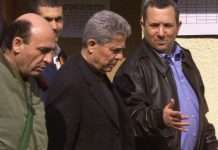At the Angelus, Francis invites the faithful to “go home, pick up the Gospel and read the passage from Matthew on talents. Meditate on what you do with them: do we share them, nurture them or keep them locked up?. After the Marian prayer, an appeal to Rome: “Tensions are too high, both sides should meet – even in the parish – to discuss and help dialogue win out”.
Vatican City (AsiaNews) – What do we do with our talents? Do we nurture them or keep them locked up? This was the question Pope Francis asked faithful gathered in St. Peter’s Square for the Sunday Angelus. The pontiff has invited everyone to do “a good thing: go back home pick up the Gospel and read the passage from Matthew on talents. Meditate on your talents and remember that God has faith in us. Don’t disappoint Him!”.
As is tradition, the Pope’s reflections were based on the Sunday Gospel: “The parable of the talents has a clear meaning: the man in the parable represents Jesus, we are the servants and the talents are the assets that the Lord has entrusted to us, his Word, the Eucharist , faith in the Heavenly Father, His forgiveness … in short, many things, His most valuable assets. While in common usage the term ‘talent’ indicates a strong individual quality – for example in music, sports, etc. – , in the parable of the talents, they are the goods of the Lord, that He entrusts to us so we can render them fruitful. The hole dug in the ground by the “wicked and lazy servant” (v. 26) indicates the fear of risk which blocks the creativity and the fecundity of ‘love. Because the fear of the risks of love blocks us! “.
Jesus, the Pope continued, “does not ask us to keep his grace locked up in the safe, but he wants us to use it for the benefit of others. All the goods that we have received are to give to others: and this is how they grow. It is as if he were telling us : ‘Here’s my mercy, my tenderness, my forgiveness: take them, and make extensive use of them’. And we, what have we done with them? Who have we ‘infected’ with our faith? How many people have we encouraged with our hope? How much love have we shared with our neighbor? These are questions that we would do well to ask ourselves. Whatever environment, even the most distant and impractical, can become a place where talents bear fruit. There are no situations or places that preclude Christian presence and witness. The witness Jesus asks of us is not closed, it is open”.
This parable, Francis pointed out, “urges us not to hide our faith and our belonging to Christ, not to bury the word of the Gospel, but to share it in our lives, in relationships, in concrete situations, as a power that challenges, purifies and renews. Likewise with forgiveness, that the Lord gives us especially in the Sacrament of Reconciliation: let’s not keep it closed within ourselves, instead we should release its power, that breaks down those walls that our selfishness has raised, that makes us take the first step in relationships that have faltered, resume dialogue where there is no communication … We must make sure these talents grow for others, bearing fruit through our witness”.
The Lord, the Pope concluded, “does not give everyone the same things and in the same way: He knows us personally and entrusts us what is right for us; but He places in all of us the same, immense trust. God trusts us; God has hope in us. Do not disappoint Him! Do not be fooled by fear, but reciprocate trust with trust! The Virgin Mary embodies this attitude in the most beautiful and fullest way. She received and accepted the highest gift, Jesus in person, and in turn offered him to humanity with a generous heart. Let us ask her to help us to be ‘good and faithful servants’, to participate in ‘the joy of Our Lord.’ “
After the Marian prayer, the Pope appealed to the authorities of the Italian capital: “In these days in Rome there were quite strong tensions between residents and immigrants. They are events that occur in several European cities, especially in outlying areas marked by other discomforts. I invite the institutions, at all levels, to prioritize what now constitutes a social emergency and which, if not addressed promptly and appropriately, risks degenerating further. May the Christian community engage in a concrete way to promote dialogue over confrontation. May the citizens and immigrants, with representatives of the institutions, come together, even in a room of the parish, and talk about the situation. The important thing, is to not give into the temptation to confrontation, but to reject all violence. It is possible to dialogue, to listen to one another, to make plans together, and in this way to overcome suspicion and prejudice, and to build a coexistence that is ever more secure, peaceful, and inclusive”.





















